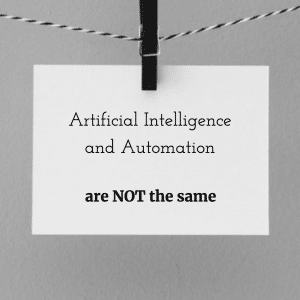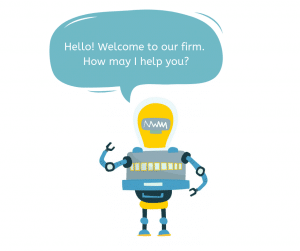The Paralegal v2.0
As technology progresses, so does our fear of being replaced by artificial intelligence (A.I.). A.I. has already made its presence known in the legal field igniting worry about our job security. The topic of Attorneys and paralegals v. Artificial Intelligence is hitting the headlines with ever-increasing presence.
Even with the new wave of A.I. pouring into the legal industry, it does not necessarily mean that paralegals will ever become obsolete. While A.I. is by some, portrayed as an enemy, it also brings something of value to the legal field.
There may be some firms that eliminate receptionist roles to cut down on costs. A paralegal serves a more substantial purpose and is likely to maintain employment. New advances in technology such as automation and A.I., can turn a month-long task that would typically require multiple attorneys and paralegals to sort through into a more efficient mode of productivity. A.I. could be a friend rather than a foe of paralegals.
Comparing Apples to Oranges
There is a common misconception between A.I. and regular computer automation, and the two terms are commonly used interchangeably. While the two may share a few similarities, they are quite different. A.I. consists of advanced computing algorithms that aim to simulate thought patterns of humans, ultimately to make autonomous decisions. Conversely, automation is software designed to follow a set of pre-programmed rules or commands, which is really, all software ever has been since the first computer program was written.
 The distinction between Artificial Intelligence and Automation
The distinction between Artificial Intelligence and Automation
Automation is already omnipresent and works to expedites several administrative tasks and automate filing systems. It is appealing to most firms because it is cost-effective and efficient. In a law firm, it is typically used to organizes emails, produce legal documents, regulate billing, and much more.
Automation allows more time for paralegals and attorneys to dedicate time to more advanced legal work. Automation provides a legal team the freedom to meet face-to-face with clients and ensure more client interaction that is sure to boost client satisfaction.
So, automation offers a single purpose: the software performs the mundane, repetitious tasks.
While automation may seem like A.I., it is not. The critical difference is that automation is embedded with manual configuration. It establishes workflows and formulas. It is software that can follow orders. This may somewhat put some jobs in jeopardy because it can quickly perform tasks faster than a human, and it is at times more reliable. For example, if an employee calls in sick, the automation software can continue the processes it is programmed to do without missing a beat.
Paralegals always desire to work smarter and not harder. Automation through the use of legal practice management software can turn the average paralegal into the new and improved “Paralegal v2.0.” It expedites several administrative tasks and automates filing systems. Many law firms have already implemented a web chat feature on their websites. That addresses the routine questions and offers a quick response instead of the calls that may flood in to ask repetitive questions and eliminates phone interruptions overall.
Interruptions can be disastrous and end up costing a law firm several thousand dollars per year. A Professor from UC Irvine presented research findings that it takes an average of twenty-three minutes for an employee to refer back to a task after an interruption. There will always be interruptions in the workplace, especially for a paralegal who multi-task on a daily basis.
Paralegals often are the main point of contact for clients; they draft and edit legal documents, complete administrative tasks, and run errands as needed. The shorter answer to what does a paralegal do is what doesn’t a paralegal do. Studies show that with each interruption, it takes on average twenty-three minutes to get back on task. For example, if there are ten interruptions a day, that could result in almost four hours of lost time a day out of an average eight-hour workday.
After all the math, that equals one thousand forty wasted hours per year. Therefore, it is incredibly beneficial and cost-effective to eliminate as many interruptions as possible.
Automation paired with A.I. allows paralegals to reduce interruptions and delegate tasks to learned A.I. which can brush through “interruptions” like no other.
iParalegal – Artificial Intelligence
A.I. is the technology that is designed to mimic what a human may think, say, or do. Unlike automation, which follows a strict predefined set of rules and orders, A.I. is constructed to learn from experiences and seek patterns and form the ability to enact the proper response. Like humans, they learn by repetition what the appropriate response is and is not.
A.I. is extremely intimidating because it is basically a replica of you or me. No need to fret, just like us humans, A.I. has its myriad of flaws. While it is not restricted by rules, it accelerates its ability to learn quickly, but it is doing so without context. It has been compared to teaching a baby to do a paralegals job, which is quite cute, but not practical.
The ABA published an article in 2017, introducing a paralegal robot that reviews patent documents. The company which developed the robot implemented A.I. to generate patent claims. The report produces a marked-up word document to address potential errors or concerns.
However, this does not mean it is a “paralegal or attorney replacement.” James Billmaier, the chief executive officer of the software, states, “[w]hat artificial technology is doing to a lot of repeatable functions, we’re just applying to a very large vertical. The attorney is still fundamental at working with the inventor and grabbing the idea.
The machine is better at creating and protecting the application.” He believes that A.I. is an impending need for law firms within the next five years, or they will appear “way behind the curve.”
Other adoptions of A.I. in legal technology include using A.I. to automate the process of document review, the analysis of legal contracts and to perform due diligence checks in contract review, for example, electronic discovery and other areas of legal research.
 Human Paralegal vs. Paralegal Bot
Human Paralegal vs. Paralegal Bot
The legal profession has and always will be client-driven and an immensely sensitive area. A.I. cannot replace compassion and genuine communication. Most people seek attorneys in times of stressful circumstances. In such personal matters, a paralegal or legal assistant, or attorney communication is necessary. If a client is calling about a murder charge or a divorced issue – human interaction is essential.
There are some non-threatening ways A.I. can effectively assist in client interaction. For example, if you have a Spanish speaking client and you speak English, right off the bat, there is a troublesome language barrier. However, with A.I. chat software, what the potential client types in Spanish can be translated and received by you in English and vice-versa.
This mode of A.I. produces real-time interaction and expands your clientele. This example illustrates that in some situations, it is a more practical conduit to have A.I. in, and it is a conversation that is not ruled out from a lack of fluency.
Paralegal Advancement
The use of new technology can place a paralegal in a better-suited position for career advancement. Paralegals become readily available to conduct more advanced research, meet with clients, and interact more closely with attorneys and assist with case strategy. It is not too uncommon for an attorney to bring a paralegal to court because the paralegal has spent hours on the case and is familiar with the specific facts. This provides an attorney with an additional resource to utilize in court.
The more time a paralegal has to focus on law-related issues, the more likely they are to advance and refine their legal skillset. It opens the door to a higher salary and overall career advancement. It will also increase client satisfaction if the paralegal or any member of the legal staff is readily available to address their needs expeditiously.
Match Made in Heaven?
Automation and A.I. seem to complement each other. While automation software collects data, A.I. is designed to understand it through machine learning. According to an article published by Interesting Engineering, ” A.I. applications which are developed by using data make similar inferences by looking at the millions of cases in the past while giving a higher performance compared to the success of a group of human lawyers.” A.I. enables paralegals and attorneys to regain lost time.
Some ethical dilemmas are surrounding the implementation of A.I. in the legal industry. The concerns are if A.I. would have the ability to ‘think’ subjectively like humans. If not, it could open the door to prejudices and lead to wrong suggestions and incorrect decisions. A.I. is not yet able to ascertain social conflicts.
Collaboration
Humans and A.I. can collaborate instead of competing against each other to have a more desirable outcome for all parties involved. As legal software for paralegals changes, we must learn to adapt. Paralegals are accustomed to adapting to constant changes within the industry. A.I. will allow paralegals to become more cultivated and grow their knowledge of the law and its many processes.
A.I. cannot replace face-to-face contact, and a robot cannot argue a case in front of a robot judge. A.I. opens the door to career advancement and new possibilities to become experts in A.I. and managing the processes. The key is to adapt and embrace the change A.I. brings into the legal industry. Become an expert on both automation and A.I. and educate yourself on how the adoption of both automation, A.I. and certain A.I. technologies could not only benefit you but your firm as well.